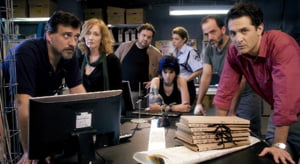Prepare for drama at MipTV
Michael Pickard previews new dramas being launched to buyers at MipTV, and suggests programming from as far afield as Argentina and Israel will attract a good deal of interest.

Falcón
The meetings have been arranged, the schedules locked down. With just days until the beginning of MipTV, programming buyers and sellers are preparing to arrive en masse in Cannes for what promises to be four days of back-to-back meetings and the chance to catch up with old friends over an early evening cocktail.
So what’s in the script for acquisition executives looking to snap up the next big-budget drama or miniseries?
The red carpet will be rolled out for ITV Studios Global Entertainment when the distributor hosts a gala screening of Julian Fellowes’ Titanic (4×60’) on Sunday evening. The show has already been sold into 86 countries.
However, it is also bringing to the market six new series. They include Falcón (4×60’) is a detective drama set in Seville, produced by UK indie Mammoth Screen for Sky Atlantic, ZDF and Canal+ in Spain. Meanwhile, Mr Selfridge (10×60’), an ITV Studios commission from parent broadcaster ITV1, is a period drama about the life of the flamboyant founder of the London department story.
 Cineflix Rights and Germany’s Beta Film will be launching Copper (10×60’), Tom Fontana’s follow-up to renaissance series Borgia, about a police officer patrolling the Five Points district in 1860s New York City.
Cineflix Rights and Germany’s Beta Film will be launching Copper (10×60’), Tom Fontana’s follow-up to renaissance series Borgia, about a police officer patrolling the Five Points district in 1860s New York City.
And fresh from landing a series order from Netflix for psychological thriller Hemlock Grove, Gaumont International Television will be bringing the show to MipTV alongside Hannibal (13×60’), which has had a series commitment from US network NBC, and period miniseries Madame Tussard.
In addition, SevenOne International will be launching Le Grand, Hollywood star Jean Reno’s first lead role in a television series. The police drama will be produced by Lagardère Entertainment subsidiary Atlantique Productions.
Content Television has picked up rights to crime thriller Amber (4×60’), produced by Ireland’s Screenworks for RTÉ. The show had previously been due to launch in Cannes with Target Entertainment, until the distributor was put into administration by parent Metrodome and its catalogue sold off.
Tandem Communications is heading to the Côte d’Azur with World Without End (4×90’), the follow-up to medieval epic The Pillars of the Earth, and Labyrinth (2×90’), an adaptation of Kate Mosse’s novel about two women searching for the Holy Grail 800 years apart.
BBC Worldwide will be accompanied by a slate that includes Impossible Pictures’ Sinbad (13×60’), an update on the 8th Century fantasy story about an adventurer who battles monsters and visits magical places.
Meanwhile, Telenovela specialists Venevision International is attending with El Talisman (The Talisman), Natalia de Mar (Natalia) and Corazon Apasionado (Passions of the Heart), the latter having secured a pre-MipTV sale to Spanish pubcaster Television Española.
However, there is likely to be a lot of interest reserved for new series coming from Israel, following the success of HBO’s In Treatment and Showtime’s Homeland, two US shows based on Israeli formats.

Street Justice
Dori Media Group, which distributes In Treatment, has picked up sales rights to the Argentine version, En Terapia (45×30’). It also has on its slate comedy drama Shall We Kiss (13×45’), which has been remade by HBO Hungary, and telenovela Soltera Otra Vez (Single Again, 60×45’).
Meanwhile, Armoza Formats has added cop drama Street Justice (11×50’) to its slate. The show, produced by Artza Productions and about a hot-headed detective who takes the law into his own hands, will line up alongside other scripted fare including The Naked Truth and Danny Hollywood.
“In Israel, it’s very unusual to have a police or crime drama,” says Kelly Wright, sales manager for English-speaking territories at Armoza. “A lot of our shows, like Homeland, are about the army, so this is the civilian side of keeping the peace.
“Because our budgets are so low – we’re definitely not operating on the US$3m per hour budgets that they have in the US, they’re around US$100,000 an episode or less – it actually adds to the raw feeling the show brings. You really feel like the show is happening on the streets and it adds to the aesthetics and atmosphere.”
The Naked Truth has already been picked up for a US remake by HBO and has been optioned by HBO Central Europe for production by ATM Grupa in Poland. Star TV in Turkey is also adapting the format.

Kelly Wright
Meanwhile, US network The CW has ordered a pilot of Joey Dakota, based on the Hollywood format about a filmmaker who goes back in time to try to save the life of her rock star documentary subject.
Another US network, NBC, has ordered a pilot called Midnight Sun, based on the Israeli show Pillars of Smoke, about a female FBI agent who uncovers a conspiracy.
The success of adapted Israeli formats has also led to the acquisition of original shows, with UK diginet Sky Arts landing Hatufim, on which Homeland is based, and BeTipul, the original series that became In Treatment.
“The Israeli TV industry is incredibly prolific for the size of the country and the budgets that is has,” Wright says. “There’s something in the Israeli temperament that doesn’t permit more than a few seasons of a show, so they’re always having to come up with new series and new ideas, and they’re willing to take risks.
“They’ll take a chance on any idea that’s provocative and good. The world responds because the storytelling is unique and the budgets are low enough that it can be reproduced in any territory in the world. With that combination, you have a show that can travel anywhere.”
The Israeli boom is following on the heels of a similar explosion in the popularity of Scandinavian content, beginning with crime series Wallander through to The Killing and political drama Borgen.

The Naked Truth
Wright adds: “Dramas are not just coming from one country, they’re coming from all over. South Korea produces excellent dramas and we see South American telenovelas on TV in Israel. Foreign series are not just the domain of the SBS-type channel anymore, they’re now the domain of the big commercial channels and subscription channels.
“Globalisation is part of the industry we need to test more, because if we sell the formats, how do we also sell the original series? That’s definitely something people are responding to.”
While those might be some of the highlights, buyers will also be keen to unearth some hidden gems that could become the focus of their fall schedules, or represent breakout hits for a previously overlooked territory.
In addition, international coproductions are likely to still be the subject of many conversations as broadcasters and producers are keener than ever to club their resources together, with distributors getting involved at an earlier stage of development.
See you there.
















.jpg)




























